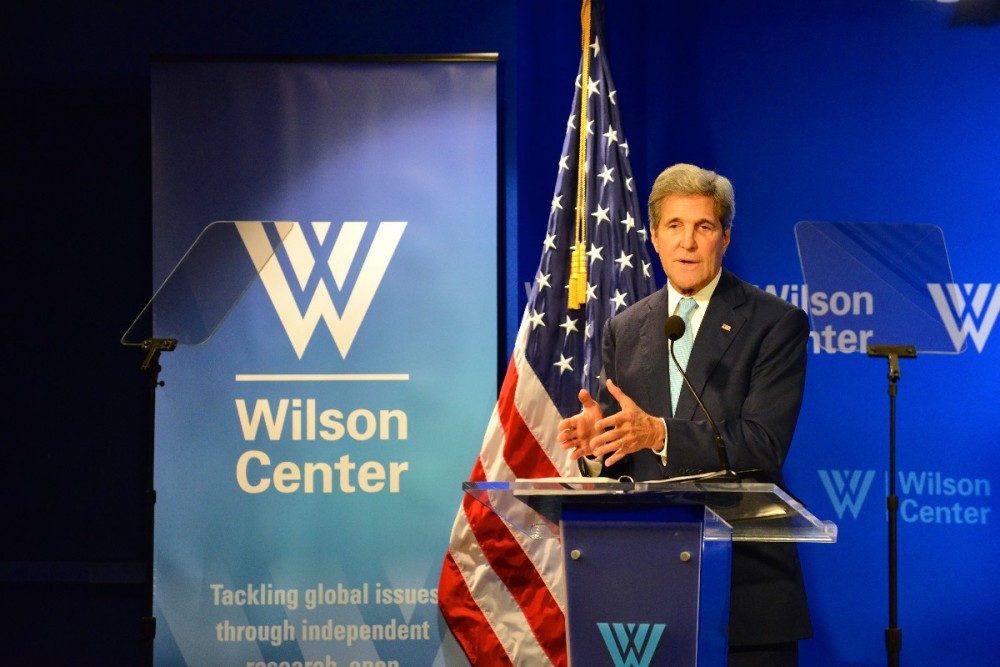 U.S. Department of State
U.S. Department of State
The TPP and U.S. Strategic Leadership in the Pacific Rim
On September 28, Secretary of State John F. Kerry spoke at the Wilson Center regarding the impact U.S. trade policy has on U.S. strategic leadership around the globe.
Free Trade Agreements (FTAs) and trade policies as we know them emerged from the wreckage of the Second World War, beginning with the General Agreement on Tariffs and Trade in 1947. From the start, it was understood that enhancing trade relations was pivotal in establishing stability and security between nations.
Sec. Kerry argues that today, the world is more complex and connected than ever before, and more cornerstones of healthy economies need to be incorporated into trade deals to ensure that global markets are more efficient, uniform, and fair. For Sec. Kerry, the Trans-Pacific Partnership (TPP) reflects this new global landscape by incorporating labor standards, environmental standards, intellectual property laws, and uniformity of regulations, beyond the traditional attentions paid to tariffs. For the first time, the TPP would make breaking these new standards punishable by sanctions.
There is heated debate surrounding the TPP in today’s political sphere. However, for Sec. Kerry, the TPP could never be the answer to all of the United States’ economic challenges. There is no one solution to what some call secular stagnation. However, problems of job dislocation cannot be attributed to the facilitation of trade, Sec. Kerry argues. Issues such as these are realities that can only be combatted by technological progress, and need to be met by governments through the provision of training and research.
Instead, Sec. Kerry asserts the unarguable necessity of the TPP lies in the deal’s strategic importance to U.S. influence in the Pacific Rim, influence that the U.S. has maintained thus far based on a history of consistency.
Why Sec. Kerry believes Asia has come to expect consistent diplomatic relations from the U.S.
- Geography: The United States straddles the East and Western geopolitical spheres.
- Economic Bonds: Five of the United States’ top ten trading partners are in Asia.
- Defense Cooperation: The United States has a history defending Japan, South Korea, Australia, New Zealand, and the Philippines and close coordination with APEC and ASEAN.
- Shared Diplomatic Agendas: The two regions share similar goals on counter terrorism, nonproliferation, climate change, cyber security, human trafficking, and maritime security.
- Shared National Security Agendas: centered primarily on responding effectively to nuclear provocations from North Korea, and competing territorial and maritime disputes in the South China Sea.
Rejecting the TPP would be a disastrous step away from this legacy of consistency, and the U.S. would be made weaker in the region through the rejection of a deal that it began negotiations for and agreed to itself. If the U.S. facilitated the ceding of its own influence in the most dynamic marketplace of the twenty-first century, Sec. Kerry has no doubt that another power would rise to take its place, one that does not respect higher labor standards, environmental standards, intellectual property, a free and open internet, and repeatedly ignores rule of law. While never directly mentioned, it was clear he was referring to China.
Rejecting the TPP would surely weaken the U.S. on the international stage through the deterioration of longstanding relationships in the region, and the expansion of Chinese interests.
In Sec. Kerry’s words, “Much of the world’s twenty first century history will be written in Asia…” and it is up to Congress to decide whether the United States will have a seat at the table.





